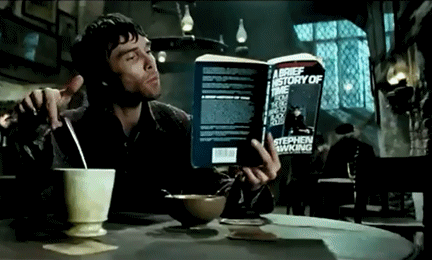 |
| Blessed be the Maiden Goddess on this holy Sabbat of Ostara. |
Some books have very detailed rules of magic, while others are more laid back. One series with the loosest rules of magic I can immediately think of would be Harry Potter. Harry didn't have mana, or even get tired if he cast too many spells (as far as I'm aware of, please correct me if I'm wrong), nor did he have to do any setup or preparation. The only limits were that they had to use words and wands.
 |
| Except for this badass reading Stephen Hawking |
Here's a rundown of magics that I've come across and/or used. They are usually a mixed and matched to fit the story.
Physics
Some people like to anchor magic with physics, and I use a little bit of this myself. To create a fireball, Crystal has to gather heat from her surrounding area. A witch creating a fireball would then see their breath fogging up. The same would be for ice, in order to freeze something, a witch would have to heat up the air around them. Realistically using these two abilities would risk hypo and hyperthermia if used on a grand enough scale. If you are writing using magic of this caliber, consider using it more creatively than just an attack. A good example is in the Dresden Files Series, Harry manages to shoot a fireball up into the sky not to attack something, but so that he could draw heat from a lake and freeze the surface, giving him a chance to run across the surface.
Knowledge
In my personal opinion, this one is pretty weak. You need to read dozens upon dozens of books just to light a candle with your mind. Instead, consider real-life hobbies. You are building a deck.
| Fancy. |
Mana
Mana is a general term for "magic power" it's pretty common in videogames, that gauge below your health meter that is always blue for some reason. Mana is typically used in some form or another. It's why a character gets tired after casting a bunch of magic. Mana comes from various sources and depends on the book your reading. It can be from within, from the air, from someone's life source, from specific items. It can also be called nearly anything: energy, essence, MP, ether, essence.
Object enchantment
Even if mages require books or have mana-based magic, there are almost always objects imbued with magic. Only in a small handful of books do you read about a mage actually charging the object with said powers, and even then, it's always on purpose. You never hear about mages accidentally creating enchanted items with a spell gone awry or even simply by a mage standing too close (I like to think of ambient magic having the properties of radiation.)
Ritual
Summoning a circle, using specific tools, Latin, rhyming words or songs. Ritual-type magic is seen more for traditional witches and less mages or sorcerers.
Others
Jim Butcher's Codex of Alera uses "furies" or spirits, for magic.
The Mortal Instruments series uses runes.
 |
| And stupidity. Runes and stupidity. |
And then there's the general "born with a natural affinity" that books seem to love.
There are lots of ways to get magic, but what do you do once you have it?
The most popular is the four elements: earth, fire, air, and water. Fire is always super popular because it doesn't take a lot of brain power to write, so it's always refreshing to see the other elements used as a primary. I don't mean having the power of air and pushing someone over with it, either. If you have the power of air and feel like killing someone, how about sucking it straight out of their lungs? Bet that would work pretty well. Air is always seen as the weakest, daintiest magic, but given some serious consideration, I bet a good author could make an air-based mage pretty formidable.
Sometimes, when a writer is feeling "really creative," they'll throw in other elements. Light and shadow being another two. Occasionally earth will be split in two, creating rock and plant magics. Ice and water are separated quite often, because apparently the temperature can make a difference. Healing, protective, summoning, if you want to get into more obscure concepts. Hey, you know who would be perfect in a medical facility during war time? A fire mage. I'm not kidding. Got a wound? let's cauterize that sucker!
A character of mine used in a collaborative writing forum used completely random spells. The most memorable being a battle golem made of cat litter.
That said, use "magic elements" more creatively than what's been done to death. Better yet, think of a totally different magic system. Mistborn by Brandon Sanderson uses ingested metals to create unique powers that totally blew my mind.
Do some research outside of reading this post. Look up "rules of magic" or think back to some books you've read. Magic is such a nebulous concept, so why have we allowed ourselves to assume such cliche rules about it?
No comments:
Post a Comment